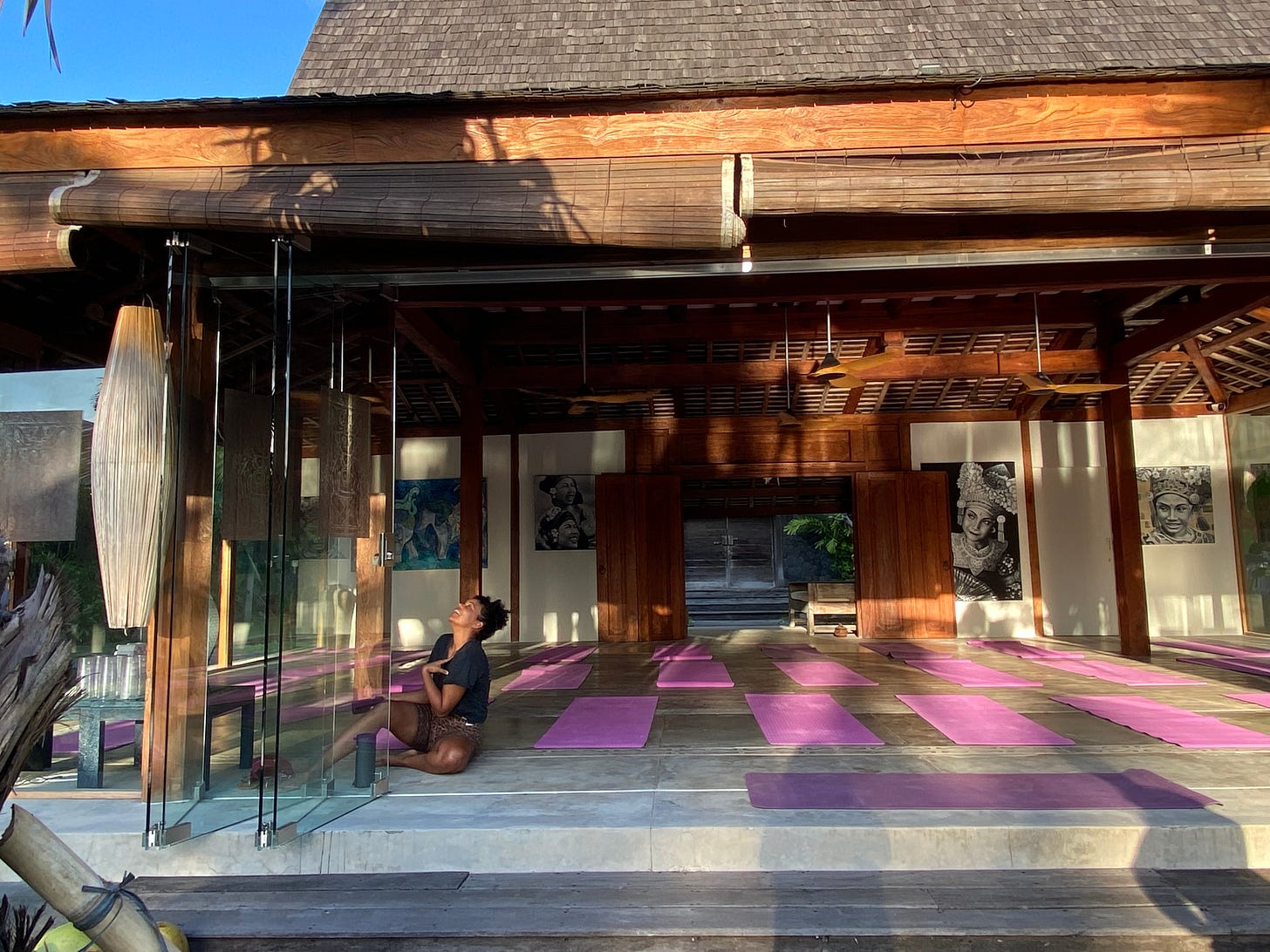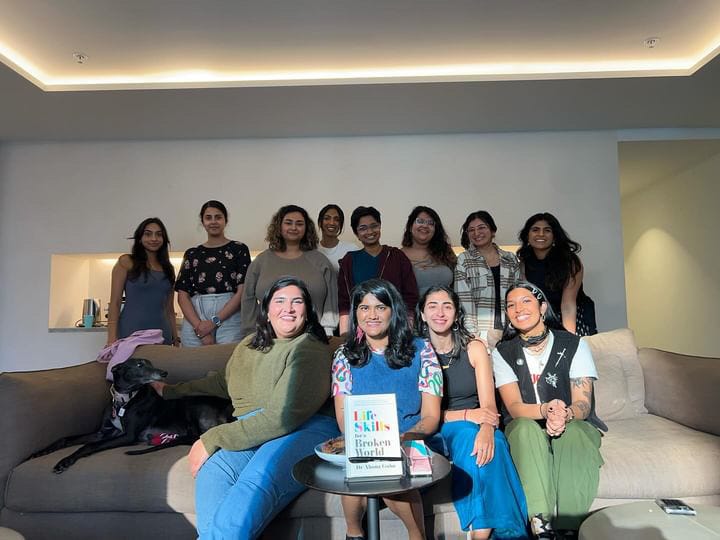August
On anticipatory grief, not being as burnt-out anymore, and a skedaddle of other things.
Dearest Gentle Reader
What a bizarre month August has been, weather-wise anyway. I spun into yoga class today (the only descriptor which aligns really) all atwitter about how terribly ungrounded and generally discombobulated I felt. The wise Lou suggested that it was the wind and told me I should swing with it and lie on my stomach and do some belly compression work — and I did just that during yin class, and left feeling somewhat more contained. My discombobulation might also be attributable to heading off on leave soon and the general chaos which usually accompanies that, as well as feeling displaced in my usual routine because I’m taking a writing break. My brain started to fold in on itself at the start of the month, a nudge to look at how much intellectual/cognitive work I am doing, and I decided to halt book writing (a marathon, not a sprint yes?) in favour of some sleep (no early starts) and other forms of exploration. I do miss the anchor of my 5 - 7 am writing stints, and feel like I flit and fleet without this. I can feel myself opening up to this routine again soon.
Anyway, if you too feel like this, can I suggest lying on your belly with a bolster or rolled up towel under you? It helps!
Burnt-out no more
I was looking through pictures from last year and realised that this time last year I was on a yoga retreat in Bali. I was so so over-extended with work before this retreat that I collapsed as soon as I arrived and found it very hard to engage in any conversational group activities, opting out of the sharing circles. I was reflecting on the fact that I have not experienced similar levels of burnout this year (hurray!) and the main differences have been more exercise — I signed up for a studio membership and go to yoga/weights between 2-4 times per week, more monitoring of my own needs and capacities, more careful balance with very risky forensic clients, more somatic/body based work (my mental health rests solely in the gentle hands of a massage therapist), and small buffers/gentle slowing down (no more two books in < 12 months). Somatic approaches have been especially helpful to support me with moving stress through my bodies. I’ve historically been very skeptical of any somatic work or anything even slightly woo. This skepticism is born of having been in a cult and of having had a relatively terrible Pentecostal psychologist who kept talking to me about demons. As a reaction to both these experiences, I embedded myself in hard science only pls for a long time, and am only just starting to open up to approaches which cannot be quantified by p <.05. Massage and yoga are the two approaches I turn to — as well as a good ol’ branch of burning sage for times when my energy feels a bit gritty. Hey, the placebo effect is as good as anything!
Additionally, like most people I was never really taught to care for myself well, and like most psychologists I have some unrelenting standards/self-sacrifice schemas. Working to reduce the impact these schemas have on me requires frequent examination and monitoring. After about 15 years with my own psychologist, her constant exhortations to slow doing might finally be starting to sink in!
That said, I’ve been offered and accepted a place in the Masters of Public Policy and Management at Melbourne uni to commence next year, so we’ll see how I transact the work/study juggle (AGAIN). Psychology study was demanding and draining, but I have access to more resources and social capital now and will be structuring my years to ensure I have adequate time off for study. I want to do some deep learning during this course, not just skip through to the finish line and am looking at a course structure which will equip me to do some good work in the social/health policy space down the track. I’m not sure where I’ll go with this course but it feels exciting to have new possibilities open, even if I can’t see them yet.
Anticipatory grief
I’ve been mulling over a few things recently, and grief/anticipatory grief has been one of these things. This was triggered by The Greyhound suddenly deciding that she was going to start hopping around dramatically one evening, one hind-leg held high in the air. Like any senior greyhound parent, I immediately decided she had osteosarcoma (it is the scourge of the breed) and experienced some intense anxiety and grief until I took her to the vet the next day, and was told (calmly and carefully — like I was the weeping and snivelling village idiot) that her toe was swollen and she likely had grit in it (another greyhound malady). That is exactly what it eventually turned out to be, but I rubbed closer to the grief of losing her than I’ve ever been.
I’ve worried about losing her since the day I got her. I’m not ashamed to admit this, and many pet guardians tell me they feel the same way. What an odd thing it is, to open your home and heart to a being who will almost certainly leave you well before you are ready for that. No other relationship requires this of us — we expect relationships will be for keeps, we usually outlive our children, and now expect that we will only lose parents and other relatives well into our later years. Of course, many people experience untimely losses, but this is almost always unexpected. It’s only with pets that we enter the relationship knowing we will feel this immense twist of pain. I can only assume that it is a testament to our domestic pets and the bond they’ve established with us, that we continue to allow this grief. I’ve heard pets described as ‘tiny tragedies’ and I wholeheartedly concur.
Anticipatory grief is a type of grief, but we feel it before the loss. It may occur in the context of a loved being declining and becoming unwell, or simply (as with Karla and I) because we know a loss will occur someday. It can be difficult to tolerate and manage, because there’s no real remedy or timeline, no closure, no ritualistic grieving process — just this terrible sword of Damocles hanging over you. This form of grief might be helpful as preparation for eventual grief, but it can also detract from the joys of being in the moment, and of holding love and connection now. When I feel this form of grief too intensely, I find myself detaching from Karla, likely as a means of protecting myself.
Psychological grief work involves a few components — accepting the loss, grieving it, learning to create a new life and meaning without the loved one, and staying connected to the loved being in certain ways. While there’s been little research into the tasks of managing anticipatory grief, some of these will apply as well, though they’ll have to be transacted psychologically, not physically. It might help us to think about death — our own death, the death of those we care about, and the death of every human and living being who will ever exist. Death is the one certainty, and I find some peace in this when I consider loss. I also find it helpful to think of the manner in which those I love and I have come from the same stock (stardust!) and that our bodies will go straight back into this pool of universal material. Sometimes I tell Karla that we will be supernovae together someday, and she scoffs at me.
No (s)mother, you will be a dung beetle and I will be a potato.
Knowing that humans have experienced and survived terrible grief and creating a range of self-statements can be helpful (‘this will be incredibly hard, but I will survive it’), as is imagining what a life without the loved being might look like. I have a list of things up my sleeve for when I lose Karla (work overseas/for MSF, travel more, apply for fellowships) and this gives me some solace. This doesn’t and won’t take away the pain, but does provide a supportive anchor against despair. I also know I can stay connected to my values and to dogs even without her, though this will likely be via fostering for a while, instead of adopting.
I also find it helpful to simply stay present and bring my mind back to the now. A great many tomorrows (or perhaps, even one tomorrow) are not guaranteed for any of us, and the best we can do is sniff around the corners of this little life while we have it, with eagerness and interest. Let us never take this for granted.
STANDOUT AUGUST READS (otherwise known as ‘Ahona is too lazy to make a list of all she’s read’)
The Centre - Ayesha Manazir Siddiqui
The Mark - Frida Isberg
What I Would Do To You - Georgia Harper
MEDIA WRAP
I had this article published by the Saturday Paper on therapy apps.
I also spoke to the 7am podcast about the same issue.
UPCOMING EVENTS (and a bookclub just past)
After a self-imposed and much needed media hiatus, I’ve lined up a few events for the end of this year.
I’ll be appearing at Kew library on 25th November for a Q & A about Like Skills for social inclusion week, will run a webinar for the ASA on 27th November, and will be teaching a webinar for the APS on intimate partner violence on 11th December.
I also attended the Australian South Asian Centre bookclub to talk to the lovely attendees about LIFE SKILLS. It was a glorious afternoon and I appreciated the intelligent and probing questions (and the food and kindness). Thank you to Jessie and Tamana for having me <3. Talking to engaged readers is genuinely the best part of being a writer.





